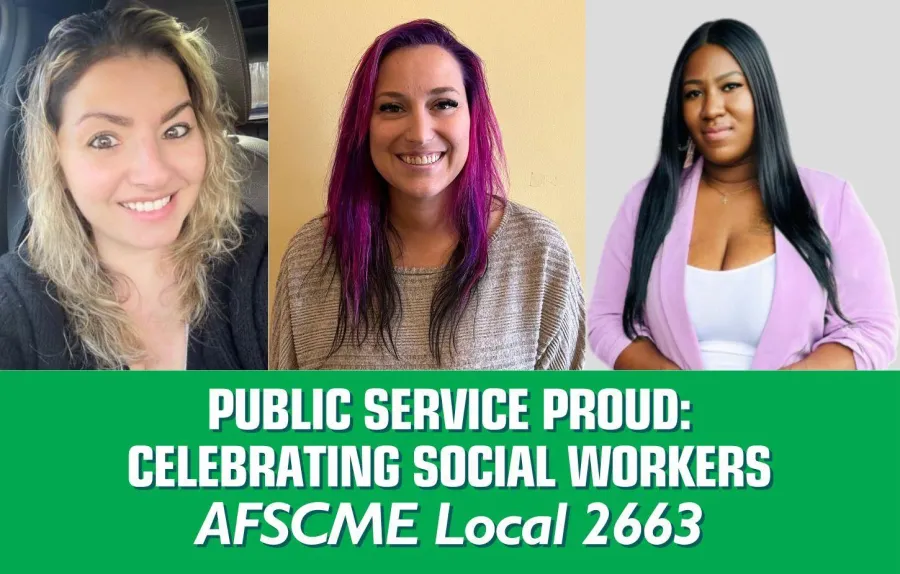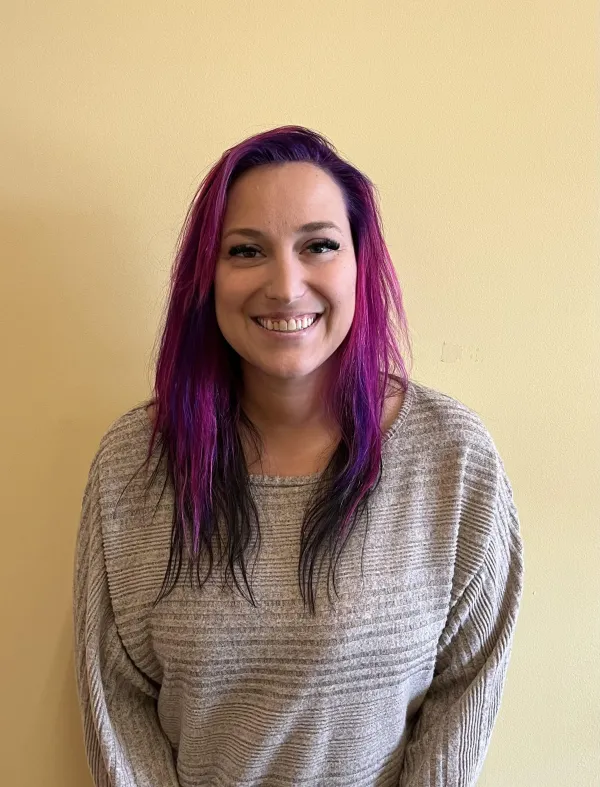Public Service Proud: Celebrating Social Workers (1/2)

This article is one part of a two-part series.
Social workers stand as a pillar of support, compassion, and advocacy for those who are the most marginalized in our communities. This March, Council 4 is highlighting incredible social work members for National Social Work Month.
Social workers work tirelessly, sometimes against overwhelming odds, to uplift those in need. Department of Children and Families (DCF) state social workers, members of AFSCME Local 2663, are no different. Behind every success story, such as a family reuniting, a child or parent receiving the services they desperately need, or a child in foster care graduating high school, there stands a social worker dedicated to being the last line of defense, the last safety net to those who need it.
Whether it is investigating cases of child abuse or neglect, conducting home visits, connecting clients to service providers, bussing kids, and more, DCF social workers are doing all they can every day to ensure that children are protected and given a fighting chance to succeed, no matter their family background.
Emma Martinez

Before Emma Martinez came to DCF in Connecticut, she was a college criminal justice major and interned with a police narcotics department in Texas. What she saw in one of her first drug busts changed the trajectory of her career forever:
“All I could follow, as police raided the house, was the history test paper in the kid’s room – a test that the kid had failed,” Martinez explained. “That kid was handcuffed on the front lawn, and I knew our system had failed them. And I also knew that what I wanted to do was to help kids like that, instead of turning over laundry to look for drugs in people’s houses.”
Martinez applies her expertise deftly to DCF work, noting how social work “is kind of an art.” “You have to learn to shift gears constantly,” said Martinez. “Every case is a moving part, and you have to tap into each of those moving parts at least once per week.”
The need to teach that art to new social workers is why Martinez co-chairs the Peer-to-Peer program at DCF Willimantic, a monthly virtual meeting where social workers have coffee and talk through all their cases and workplace problems together, with a collaboratively created agenda. “Our program is a safe space for development, growth, teamwork, and leaning on each other,” said Martinez. “We solve problems creatively together and present a united front to management – like how can we support each other to complete our home visits, under the current shortage of state cars? How can a new worker manage 45 minute drives along with their work?”
For Martinez, the Peer-to-Peer program is the best example of union values in action – of workers uniting together to make a better workplace for all, in a way that increases recruitment and retention.
“Our union is our backbone, and empowers us to talk with each other,” she said. “Not everything is negative, about us not being heard – sometimes, we just want to ask, ‘What are your thoughts on this?’ And our union facilitates those conversations that allows us to keep people through mentorship.”
Jalisa Thornton

With four years of experience conducting investigations for DCF and ten years in mental health nonprofit work prior, Jalisa Thornton is a leader at the Willimantic DCF office. She is currently co-chair of the Social Worker Peer-to-Peer program with fellow social worker Emma Martinez. Growing up, Thornton saw first-hand the impact of social workers on people in need, and resolved herself to follow in those footsteps.
“I got into social work with a desire to support and advocate for people at their most vulnerable moments,” said Thornton, who was awarded “Social Worker of the Month” by management and her peers. “Everyone deserves access to resources to thrive, regardless of their circumstances.”
Peer mentorship has been at the heart of many social workers’ journeys through DCF, including Thornton. “When I first started in 2020, I attended meetings of the Peer-to-Peer program, as a new worker coming in and getting adjusted,” she explained. “I wanted to be one of those workers who can help others get the support they need, so I stepped up when they asked me to be one of the co-chairs.”
As a Black woman, Thornton also feels a profound sense of responsibility to support and uplift marginalized communities.
“As a Black social worker, I have a privilege and a duty,” she said. “I have been in situations where I am stigmatized, and that gives me more reason to speak out and speak against bias.”
Sarah Austin

Sarah Austin worked five years with DCF in Pennsylvania before coming to Connecticut, where she has now been for six years. DCF Connecticut for Austin has been a space of support, solidarity and camaraderie in a job where workers’ labor is not always the most visible.
“The services we’re providing as social workers don’t often show themselves until we’re in court,” said Austin. “A lot of that work is not in front of a foster parent – like being on the phone with a provider, or taking a kid somewhere, or making referrals. We have to fit all that in while we’re building relationships with both the kids and parents.”
Despite this hard work of juggling many different pieces, Austin feels that it’s all worth it. “Recently a mom reached back out to us, who was involved with DCF for over a year. She got out of an in-patient substance abuse program on her own, and thanked us for supporting her through 17 months of sobriety,” she recounted. “There are few reminders like these that our work matters.”
“The payoff is amazing when the kid gets adopted, or they go back home, when you go for the closing visit. This is the fuel that keeps us going,” continued Austin. “We are blessed in the permanency unit, there’s no other way to explain that. The only thing that keeps us going is seeing each case from the beginning to the very end.”
Austin credits the Peer-to-Peer program and the strong culture of collaboration at DCF Willimantic for how she and her coworkers have remained motivated while handling difficult cases. “You cannot do this job alone – you need your coworkers to be successful. Your case is my case, your unit’s cases are your cases,” explained Austin. “At the end of the day, the safety of the child is what matters, and your team is what matters. We give each other fresh eyes and different perspectives on a case.”
DCF Social Workers: A Cornerstone of Justice and Equity
"Social workers are a backbone of the safety net our society relies on," said Marybeth Kaczynski-Hill, President of AFSCME Local 2663, in reflection of Social Work Month. "We are that lifeline dedicated to families in need of support. As a DCF social worker, I am proud to be a union president who fights every day to ensure our social worker members receive respect and protections afforded to them by the union.”
In celebrating Connecticut's social workers, we recognize their tireless efforts in uplifting children and families. Through their unwavering commitment to compassion, advocacy, and social justice, these individuals move beyond challenging situations to show up for others in their time of need. As we honor their dedication and resilience, let us reaffirm our commitment to supporting and empowering these champions of empathy, the cornerstone of a more just and equitable society.
Be a #PublicServiceProud member! Do you know a member doing extraordinary things on the job or in their community? Get in touch with us at [email protected]
